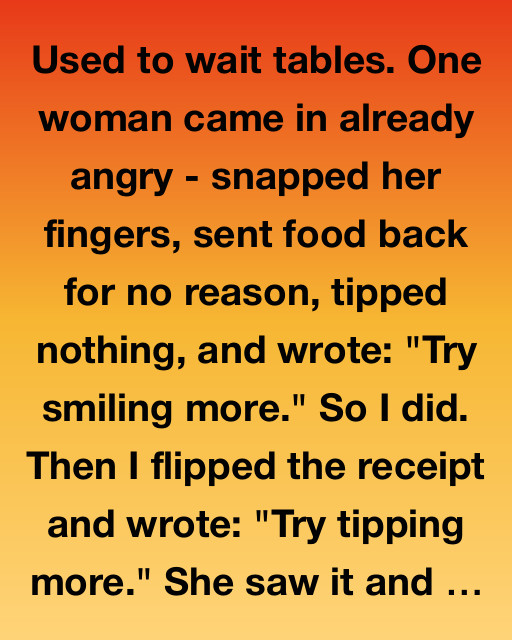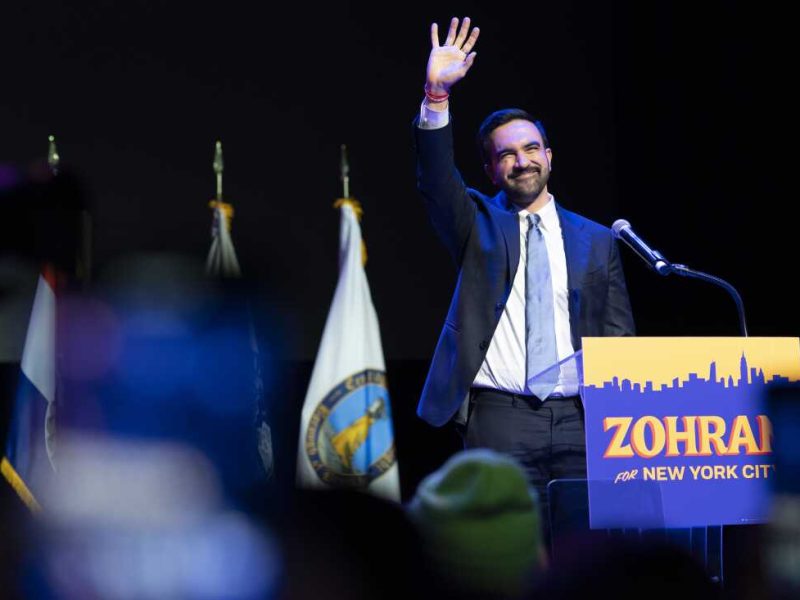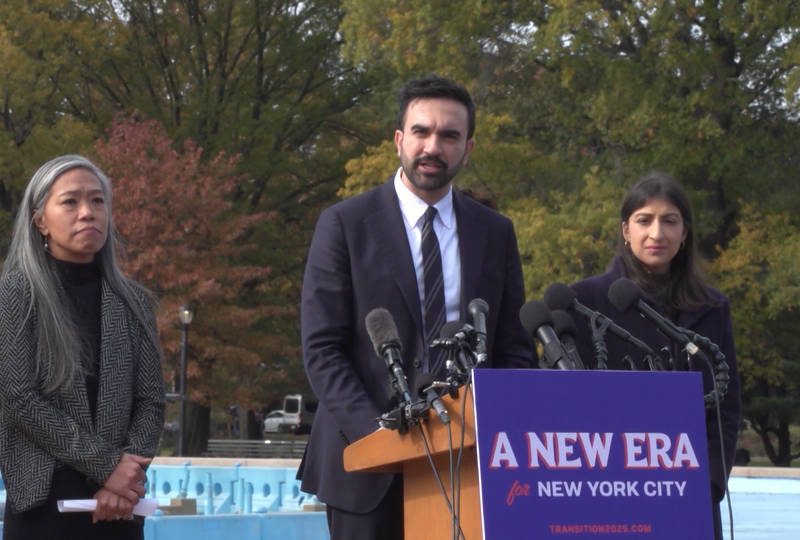Used to wait tables. One woman came in already angry – snapped her fingers, sent food back for no reason, tipped nothing, and wrote: “Try smiling more.” So I did. Then I flipped the receipt and wrote: “Try tipping more.” She saw it and froze.
For a second, she looked like she was about to explode. Her eyes flicked back to mine – narrow, cold. I thought I was about to get fired or at least yelled at in front of everyone. Instead, she stood up, grabbed her purse, and walked out without another word.
I figured that was the end of it. Just another unpleasant customer in a long line of them. I was used to them, honestly. Working at a mid-tier diner on the edge of downtown, you get all types. The ones who pretend you’re invisible. The ones who treat you like a servant. And the rare kind ones, who leave a smile and a decent tip. But her? She stuck in my mind.
Not because of what she said, but because I recognized something in her face as she left. Not anger. Not offense. Guilt.
A few days went by. Life went on. Pancakes flipped, orders messed up, coffee poured. Then, on a slow Tuesday afternoon, she came back.
I saw her before she saw me. Same stiff walk, same sharp blouse. But something was different. She looked tired. Not in the “bad day” way – more like she hadn’t slept properly in weeks. She sat down at the same corner booth. This time, she didn’t snap her fingers. She waited.
I walked over, unsure of what to expect. My stomach was doing this weird little flip. “Hey,” I said cautiously. “Back again?”
She didn’t smile, but her voice was softer. “Yeah. I owe you an apology.”
That was not what I expected.
She reached into her bag and pulled out a folded piece of paper. I thought it might be a complaint form or some printed-out online review, but it wasn’t. It was a letter. Handwritten.
“I didn’t tip you that day because… well, not because you didn’t deserve it. You were fine. It’s just… I was angry. Not at you. At everything.”
I didn’t say anything. Just stood there while she fidgeted with her hands.
“My son… he died. A month ago. Car accident. I haven’t been okay. And the day I came in, it was his birthday.”
It hit me like a wave. Her coldness. The snapping. The note. It wasn’t about me at all. It was grief, lashing out at the nearest thing that moved. I suddenly felt terrible about my little comeback on the receipt.
“I’m really sorry,” I said.
She shook her head. “No, I’m sorry. What you wrote? You were right. I was being rude. I guess I just needed someone to notice I was falling apart. I know it’s not your job, but…”
Her voice cracked. She looked down, embarrassed.
I slid into the booth across from her. Probably not “professional,” but something told me this wasn’t about the rules.
“I didn’t know,” I said. “But… thanks for coming back. Most people wouldn’t.”
She nodded. “Can I get a coffee? Just… sit for a bit?”
I didn’t ask for payment. I just brought her the coffee and sat down when I could. She told me about her son. His name was Jonah. He loved skateboarding, terrible horror movies, and over-sugared cereal. She smiled once when she talked about how he used to microwave marshmallows until they exploded.
We talked for an hour. She left a $20 tip for a $3 coffee.
That should’ve been the end of it. But life has this funny way of folding back on itself.
Over the next few weeks, she became a regular. Same booth. Same coffee. Sometimes a croissant. Sometimes a story about Jonah. I never pushed, never pried. Just listened.
Her name was Denise.
One morning, I came into the diner and found a small envelope at the counter with my name on it. Inside was a note from Denise.
“You reminded me that kindness still exists, even when the world feels like it’s ending. Thank you.”
And a check. For $500.
I was stunned. That was rent money. More than rent, actually. I ran out to the street hoping to catch her, but she wasn’t there.
The next day, she came in like nothing happened. When I tried to say something, she waved it off.
“I sold some of Jonah’s things. Thought the money could go to someone trying to stay afloat. I figured you probably are.”
She was right. I had been two weeks late on rent. My manager was about to cut my hours too. That check saved me.
Then came the twist I never saw coming.
One Friday night, a man came into the diner wearing a suit that didn’t quite fit and glasses that kept sliding down his nose. He asked if I was “the guy who made Denise smile again.”
I blinked. “I guess?”
He smiled. “She talks about you. I’m her brother. My name’s Greg. I run a small nonprofit for youth programs, but I also work with a food truck that gives ex-cons a second chance.”
I was still confused. “Okay…”
He leaned in. “We need someone who knows food. Who’s not afraid of people. Denise says you’re good with both.”
Turns out, they were opening a new diner downtown – same concept, but with a twist. Every employee would be someone trying to restart life: people who got out of prison, left shelters, aged out of the system. They needed someone to manage the floor and help train new servers.
Me.
I’d never managed anything before. I didn’t even finish college. But he said Denise believed in me. And that was enough.
I took the leap.
Leaving the old diner was hard. It had been my survival ground. But the new place – called Second Serve – opened three months later.
It wasn’t glamorous. The plumbing gave us issues. The fryer broke twice in the first week. But every person there wanted a second shot at life. And I got to be part of that. Not just flipping pancakes, but flipping lives.
One of our first hires was a guy named Ramon. He’d spent time in prison for robbery, but man, he had a heart. Quiet. Watched everything. Took notes when I showed him how to balance plates on one arm.
One day, a customer gave him attitude. He flinched, like he was expecting to be hit. But I stepped in, calm, firm. Reminded the customer we treated people with respect here – both ways.
Afterward, Ramon said, “No one’s ever stood up for me before.”
That moment stuck with me.
Another was Kayla – just turned 19. She’d been homeless since she was 15. First shift, she dropped a tray of mugs. Shattered everywhere. She started crying, saying she’d just go, she knew she’d mess it up.
I handed her a mop and said, “You’re not going anywhere. You’re learning. Like we all are.”
She stayed. Now she’s our best waitress.
Six months in, Denise came to visit.
She looked around, saw the place full of people laughing, working, eating. Her eyes filled with tears.
“I’m proud of you,” she said.
“I wouldn’t be here without you,” I replied.
She laughed. “I just wrote something rude on a receipt.”
“No,” I said. “You came back. That’s what mattered.”
And she did. Again and again. Donated meals. Sponsored one of our workers through night school. Even started a small support group for grieving parents, right there in our side room on Tuesdays.
I never expected a snide comment to lead to all this. A diner. A community. A second chance – not just for others, but for myself too.
And here’s the kicker.
A year after we opened, a young guy came in one afternoon. Nervous, hands in his hoodie pocket. I recognized something in his eyes – that same lost look Denise had that first day.
He sat in the same booth.
Didn’t order much. Just a coffee. Didn’t speak much either. Until I brought the check.
He flipped it over and wrote:
“Try smiling more.”
I almost laughed. But then he said, “I don’t know why I wrote that. It’s just… I’ve had the worst month of my life.”
I sat down across from him.
“Want to talk about it?”
He hesitated. Then nodded.
And just like that, the cycle started again.
Sometimes, all it takes is a smile, a seat, and someone who listens.
Moral of the story? Don’t underestimate the power of showing up again. Of saying sorry. Of choosing kindness even when you’re hurting. One rude comment, one small act, can change a life – or many – if we let it. You never know who’s one conversation away from turning everything around.
If this story touched you, hit like and share it. Maybe someone out there needs to hear it today.


